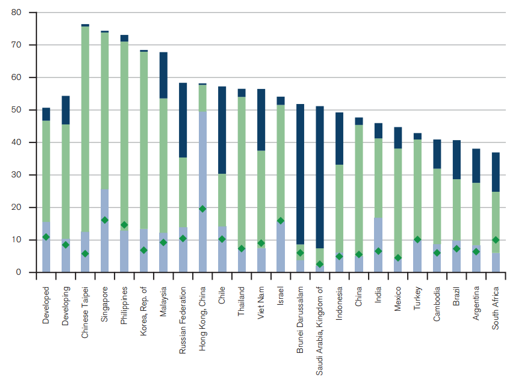The world trade globalisation
is mainly due to the increased internationalisation of the services sector:
infrastructure services (transport, communication and financial) give the
necessary support to any kind of business. Educational services offer
specialized training to improve businesses competitiveness. Increasingly, even
in the production of goods, the highest proportion of aggregate value comes
from the service sector.
In a digital environment, the
importance of the sector is even more apparent. Not only the electronic
commerce became possible by the availability of services related to computers
and to telecommunications, but also the Internet environment is a service
ambience.
Regarding
wealth generation, the services sector is also very important, since it’s the
main sector in terms of the Gross Value Added in many nations, as demonstrated
by the World Bank (2010), which shows that developed countries have the biggest
participation from the services sector (73%) – against 53% from medium income
and 46% from countries with low income. In fact, the more developed the
country, the greater the share of services sector in its economy.
Value added by sectors as a
percentage of the GDP – 2008
In Brazil, the service sector
traditionally represents the largest part of the economy. In 2013, the sector
accounted for 69,4% of the nation’s GDP (64,7% in 2003) and for 78,4% of its
formal employment.
FDI Inflows: top 20 host
economies, 2012 and 2013 (billions of dollars)
The WTO recognized that “services
traded across borders within Global Value Chains (GVCs) account for almost 16
per cent of developed country exports and slightly more than 10 per cent of developing
country exports. However, these figures neglect indirect exports of services
value added embodied in manufactured goods.” The organization assumes in the
World Trade Report 2014 that “in value added terms, services exports within
GVCs are only slightly lower than manufacturing exports in developing countries
and even higher in developed countries”.
Source: OECD
– WTO TiVA Databases
This was demontrated by the WTO at the World Trade Report - 2013: even though services accounted with 23% of the world trade in 2008, in fact the value-added of the tertiary sector reached 45% in the same period, when compared with the other sectors of the economy (primary products and manufacturing). This explains the tremendous importance that services play in the global value chain of the international trade as a whole.
Despite the propitious economic indicators relating to the importance of the tertiary sector in the world and in the Brazilian context, several barriers stand in the way of developing sound policies for this sector. One of the main obstacles is to find a common classification for the services sector acceptable for governmental agencies, international organizations and private sector. Another is the difficulty of measuring this trade in an efficient way. Balance of payments statistics do not show the real trade flows since they measure financial flows (economic transactions between residents and nonresidents during a specific time).
Despite the propitious economic indicators relating to the importance of the tertiary sector in the world and in the Brazilian context, several barriers stand in the way of developing sound policies for this sector. One of the main obstacles is to find a common classification for the services sector acceptable for governmental agencies, international organizations and private sector. Another is the difficulty of measuring this trade in an efficient way. Balance of payments statistics do not show the real trade flows since they measure financial flows (economic transactions between residents and nonresidents during a specific time).
Even the latest methodology
developed by the task force (United Nations, IMF, UNCTAD, OECD and European
Communities) known as EBOPS (Extended Balance of Payments, as per the MSTIS –
Manual of Statistics of International Trade in Services) has many failures
until it reaches an excellency standard.
This challenge is been
overcome since the Brazilian Federal Government launched in 2012 the Integrated
System of International Trade in Services and Intangibles (Siscoserv) and the
Brazilian Nomenclature of Services and Intangibles (NBS). With these two
powerful tools, the Brazilian society was able to develop a novel information
system on international services registration that monitors and identifies the
impact on governmental policies and companies’ business intelligence, thus
contributing for the improvement of several public policies regarding the
services sector in the country.







Nenhum comentário:
Postar um comentário